Alexander Sladkovsky: ‘I'm interested in climbing Everest’
The conductor of the main orchestra of Tatarstan talks about touring, recording, brilliant music. And about how the audience is similar to a young woman
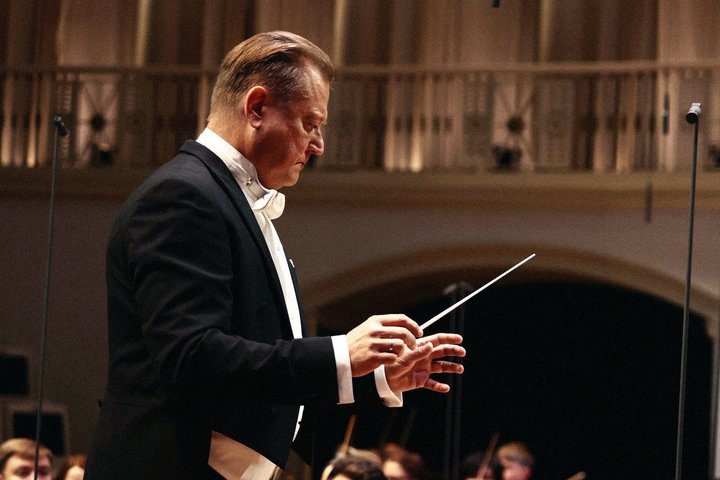
The Tatarstan State Symphony Orchestra will begin its 60th anniversary season in 2025, and, in addition, its chief conductor and director Alexander Sladkovsky is celebrating his 60th anniversary. In his interview, the maestro explains to Realnoe Vremya how musical hits are born, why you can't flirt with the audience and what helped to build one of the strongest orchestras in the country in Kazan in 15 years. He also discusses why commercial success is impossible for academy orchestras and talks about how the European audience accepts Russian musicians.
“15 years since I moved to Kazan”
The orchestra's 59th concert season is coming to an end. What events or processes during this time would you note as the most important for the team?
The support of the regional governor and the leadership of the republic. Because for me the most important thing is not some separate event, but the fact that the orchestra is growing. It will be 15 years this year since I moved to Kazan. My credo as a musician and as a person is to develop, no matter what. To develop both myself as an individual and the team that I have led for 15 years. Because it is very easy to lift a barbell. But it is very difficult to hold it for 15 years. And at the same time to build up skills and give musicians the opportunity to prove their professional worth. As for some specific events, with all due respect to the Moscow halls, it is very important for me, as a graduate of the Leningrad Conservatory, that we have won the right to play in the Great Hall of the Saint Petersburg Philharmonic. Moreover, this will have a continuation. After all, you can play once and leave. And for us, this is becoming a tradition.
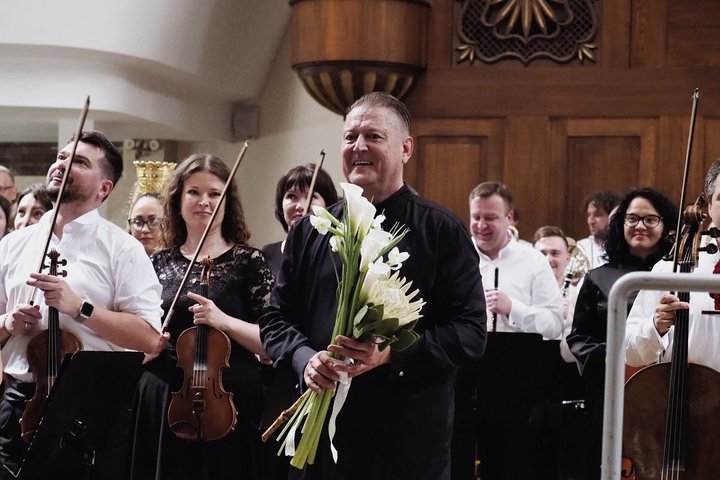
The orchestra continues its recording activities. Now you are recording a cycle of Mahler's symphonies. Tell me, for what purpose do you do this so methodically? After all, commercial success from recording activities is not primary?
Nathan Rakhlin, an outstanding conductor who founded our orchestra, was a legendary man. He had a magical effect on the audience and the orchestra. But, unfortunately, after he worked here for 13 years, no material remained from him. We can only pass on memories by word of mouth: “Oh, how it was!”
Not a single recording?
Almost none. There are some archival fragments — he conducted during the opening of KAMAZ, then still practically in an open field. There are a few pieces from a rehearsal. And that's it! Surely there were no such conditions then. And no one set such tasks for him. But for me it is very offensive. That is why I write.
We are creating a chronicle of our musical life. We are proud of the huge amount of music that has already been recorded. And these are not individual symphonies of individual composers — we write in cycles. Each musician must understand that he did not just work in an orchestra but also created a picture of this world. And so that they have large-scale creative planning and motivation, I come up with some new projects every time. I am interested in climbing Everest. For me, this is not just a game and an idea. For me, this is the meaning of life. Because if you are developing, you have to conquer new heights.
We have all of Mahler's symphonies in our repertoire. We have played them all!
“A lot of Russian orchestras go to China, this market is well-developed”
Your festivals bring together an impressive line-up: famous soloists and maestros come to you. And we still see musicians from Europe. How do you manage to maintain these cultural ties?
It is all built only on human contacts. There are musicians who come to us, no matter what. These cultural ties are the thread that unites us. And we must treat them very carefully, protect them like the apple of our eye. I can't say that now we have some huge flow of our European friends — before, they came much more. And we ourselves used to record for Mezzo and Medici, and recorded for the Sony label, and we were constantly shown in Europe. Tatarstan is known in the music world.
And if we talk about our concert activity, I am now focusing on the East. On Asia. This is an inevitable path now. After all, the orchestra needs to go on tour! This, like sound recording, is one of the factors of its development. Any trip is important for the orchestra, even if not to the Vienna Opera. By the way, if you only knew how we were received last summer in Turkmenistan! And I do everything possible to maintain close relationships with my friends and long-time partners who come to us, and to develop new opportunities to travel. In autumn, for example, we are going to Vietnam.
What will you take to Vietnam?
We will definitely take Russian music. We will play Rachmaninoff there with Denis Matsuev.
Perhaps, we will fly straight from Vietnam to China — this is currently being worked out. It is not that simple there either — a lot of Russian orchestras go to China, this market is well-developed. But we already have excellent experience, we have been there several times.
I am optimistic about the future. I am not afraid of the lack of foreign tours — here in Tatarstan we have all the resources to work with maximum efficiency. Moscow, Irkutsk, Perm, other cities — we have a huge schedule. But if the trips work out, it will be much more useful for the development of the orchestra.
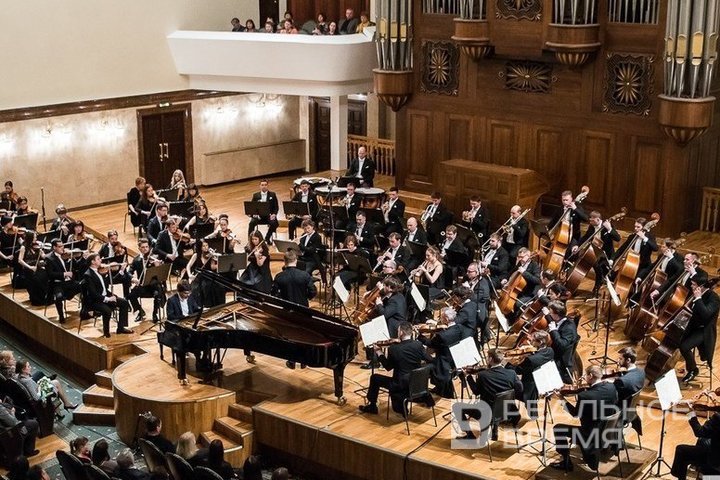
“If they invite you, it means they’ll definitely sell out the hall”
You recently worked in Bari, Italy. Can you tell me more about that?
Despite all the difficulties, in Europe, for example in Italy, in Hungary, I have good friends with whom I’ve had relationships for many years. For example, in Bari I received another invitation to perform, next season. There’s a wonderful old theatre there, a wonderful orchestra, a warm atmosphere. I play mostly Russian music there. They’ve never played much of it, for example Rachmaninoff’s Symphony No. 2.We did it with them the year before last. It’s always a challenge to make music with an unfamiliar orchestra that they don’t know. In short, it’s always difficult to visit. But they welcome you very kindly there. There are places you always want to return to.
And do the public in Italy still warmly welcome Russian musicians?
You know, I’ve never had any problems with that. Neither in Italy, nor, say, in Hungary. The second city in Hungary after Budapest is Debrecen. And they also welcome me incredibly warmly there. I was surprised: they invited me to conduct Berlioz's Symphonie fantastique at the anniversary concert dedicated to the centenary of the Debrecen Philharmonic! Last season we performed there with the outstanding tenor José Cura. Literally just now I conducted Beethoven's Overture and Symphony No. 9 there with a choir and soloists. And they invite me again next season.
You see, it all depends on who you are, what your musical reputation is, how the public receives you. No one will accept you for your pretty eyes. And if they invite you, it means they will definitely sell out the hall. In this world, everything is just like that. Of course, a huge advantage is that we speak the language of music, which everyone understands without translation. Knowing this language is a great asset, and I value it very much.
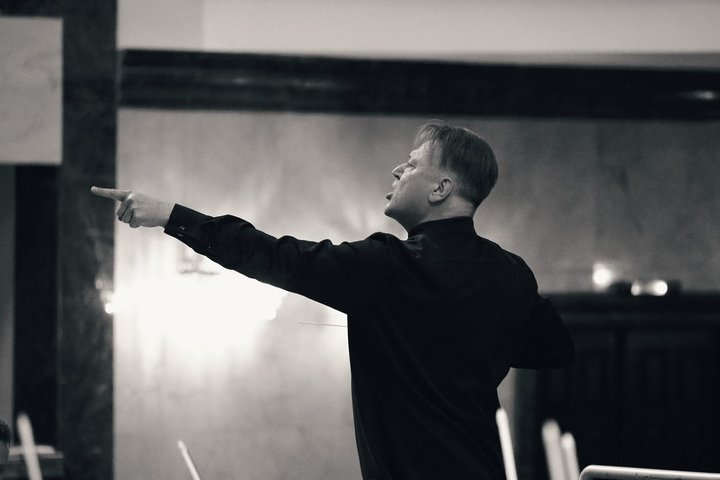
“The next step in the musical universe is Bruckner's music”
The orchestra under your leadership has proven that nothing is impossible for it. And what heights lie ahead?
In my opinion, the next step after Mahler in depth and scale in the musical universe is Bruckner's music. We have already touched on it. At Zaryadye we have already played his Symphony No. 9, the last symphony, and now we will play the Symphony No. 4 — in Kazan, in Moscow and in the Saint Petersburg Philharmonic.
Bruckner's music is a completely unique language, a different orchestral writing. And it seems to me that in many ways he is more complex than even Mahler. Not from a technical point of view, but from the point of view of inner hearing and attitude. It is a different universe.
And if we seriously discuss where we could lead the orchestra further, from a strategic point of view, I think it should be Bruckner’s music. The absolutely divine Symphonies No. 8, 7, 5 — we have all of this ahead of us. For now, I do not set the task of mastering all of Bruckner, but I see that we need to lead the orchestra in this direction. This is very meaningful, philosophical and absolutely inimitable music.
Has the orchestra already “matured” for Bruckner?
The main thing is that I am maturing for him. If I mature, then the orchestra will follow me. Because the orchestra is a reflection of the conductor. The way it sounds is what sounds in the conductor’s ears, down to the smallest details. This concerns pauses, fermatas, slowdowns, accelerations, the volume of sound, and everything else.
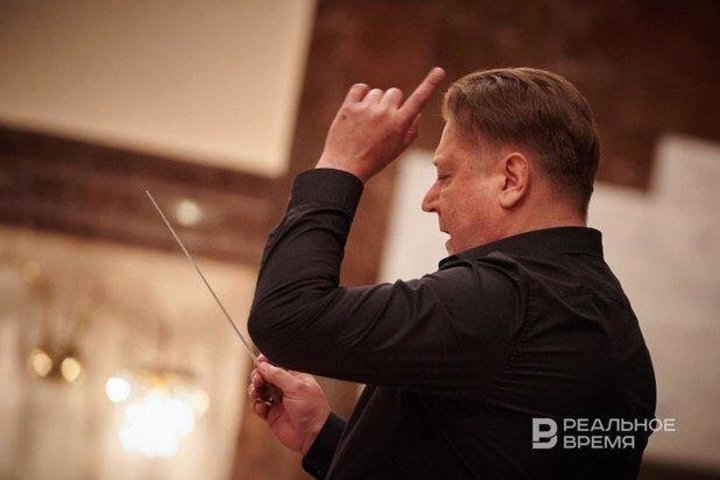
“An orchestra cannot make a living by selling concert tickets”
It turns out that in order to develop art, support from above must be a red line in every single region and group?
You understand, we have no other support. We have no sponsors. Everything is decided by administrative resources.
Are there any commercially successful symphony orchestras in Russia that work without government funding?
There are none. The only commercial classical orchestra was the Russian National Orchestra, which in the mid-nineties created by Mikhail Pletnev. But excuse me, LogoVAZ supported them at the time! They gathered all the best musicians and offered them astronomical money for that time from sponsorship funds. And in other orchestras, musicians received mere pennies and “bombed” at night to survive. But then the group was reorganized, and this whole commercial story ended. Now it is a state orchestra.
It turns out that without external injections, on its own resources, a symphony orchestra cannot exist?
Academy orchestras have no commercial success. It cannot. An orchestra cannot earn a living by selling tickets to concerts. At best, it will break even. Believe me, we would not be able to buy instruments, concert costumes, or invite guests to festivals with our extra-budgetary funds. Believe me, this is unrealistic. Not a single academic orchestra can be commercially self-sufficient.
Everything is tied to the state. It supports those artists who are truly capable and prove it with their work: they attract the public, are interesting to them, are known not only at home, but also in other cities and countries. I can’t imagine our orchestra without such support.
“Society has matured to the point of seeing something important and real”
How do you explain the surge of interest in classical art in Russia? After all, today even teenagers enjoy going to classical music concerts, and young people are eager to go to the opera. What do you think this is connected with?
The entire society must mature. It’s just that there weren’t such conditions for this before — there was a different attitude to art. And, what’s very important, today, due to free access to information, you can open any recording of any concert or festival and listen to it instantly. Previously, this could only be heard in the hall — people went there, but it wasn’t so fashionable. It seems to me that, among other things, thanks to this, today society and young people have matured to the point of seeing something important and real, in addition to pop music and entertaining stories. Something that ennobles you and influences your soul.
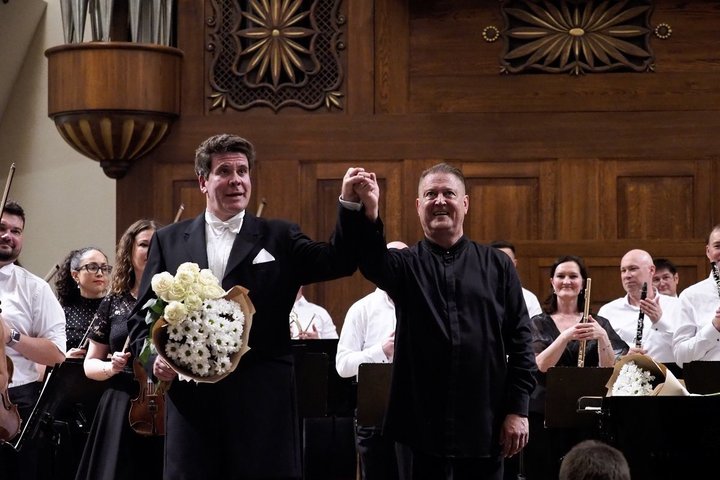
There are accounts of musicians of Russian orchestras on social media who talk about their work — in short videos, sometimes with humour. Do you think this also somehow influences the popularization of classical music among the younger generation?
I think it helps, but it does not play a big role. The role is always played by the personality. The person who stands at the console or picks up the violin, or, like Matsuev, sits down at the piano — and the audience freezes in amazement. Cooperation of individuals in this matter is also important. Look at my “iconostasis” (the editor's note: pointing to numerous photos with cultural figures). We all influence each other, help each other develop and create. We are not stewing in our own juice — we are happy to meet on this stage and in other halls.
Previously, no one came to us in Kazan. And now — a bunch of conductors, musicians, singers, composers! No matter how hard it is, I think that the time is happy for us now. I see it in my orchestra — they do not just work, they work selflessly. This is the great mystery and secret of success.
“The audience is like a young woman — she does not forgive anything”
How do classical music pieces become “hits” that everyone recognizes, even without any musical education? What is the secret?
A brilliant composer wrote brilliant music, and it enters the blood without any preparation. Firstly, this is God's providence, and secondly — cosmic things, they cannot be described in words. I attribute this only to providence.
Should an orchestra that plays classical music include such “hits” in the program or is it optional?
I think not. This is called “flirting with the audience.” I have such “hooks,” little secrets. Let's say, music from films: Indiana Jones, Star Wars, Beware of the Car. But you know how it is? You can eat ice cream sometimes. But if you eat only ice cream, you'll die of diabetes. There is a main menu, there is dessert. That's why I never think of putting together a programme so that everyone would say: “Oh, we know that, then we'll definitely go to the concert.” And the modern audience doesn't buy it — there are smart people around.
You can play such things as an encore. By the way, in my opinion, you should always play an encore — the audience in the hall always expects it. But in the West — for example, in Italy — when I suggest playing an encore, they answer: “No, no, we have regulations.” There is a different attitude to this. In Hungary, I wanted to play Berlioz's Rakoczi March — here we have a bright, beautiful encore. But they don’t have that in their repertoire, and when I heard that they were doing well, I gave up on the idea. Because the encore should be the cherry on the cake, in a polished, brilliant performance. But to make a program that will only have hits — no! I’m building the program as seriously as possible, because academic music is very serious business. And you should never flirt with the public. The public is like a girl — she does not forgive anything.
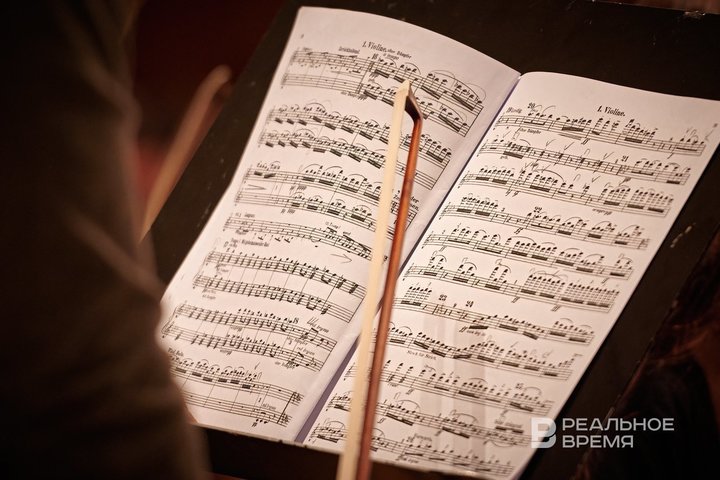
“Genius music never gets boring, that's the secret”
And what feelings and thoughts do you have as you approach your own anniversary?
No, I don't have any special feelings. I think: “I wish it would pass sooner” (laughs). 60 years is a middle age for a conductor. And I would talk about the repertoire in this vein. You forge it over the years. For example, you conducted Mahler's Symphony No. 1, and a few years later you return to this score with completely different ideas, with a different understanding of music. Because you grow and become more mature. And that means you inevitably hear this music differently!
The frequency of rehearsals is important in forming a repertoire. I can say from experience: when you have conducted music several times, then you do it meaningfully. I played Mahler's Symphony No. 1 with this orchestra for the first time in 2011, opening my second season in Kazan. It was a challenge. 14 years have passed since then. And when we performed it at the White Lilac a week ago, you heard completely different music. Because over these 14 years I have become a completely different person.
It turns out that you are constantly striving for something new, but you also regularly return to your background?
A conductor is a vessel that is constantly filling up. And the more you return to what has already been covered, the better you manage to implement what you have accumulated within yourself. It is an endless process. When people ask me: “How will you surprise us?” I answer: “You can only surprise with meanings and content.” And even if we repeat ourselves, we give new interpretations, readings, tempos of the same works.
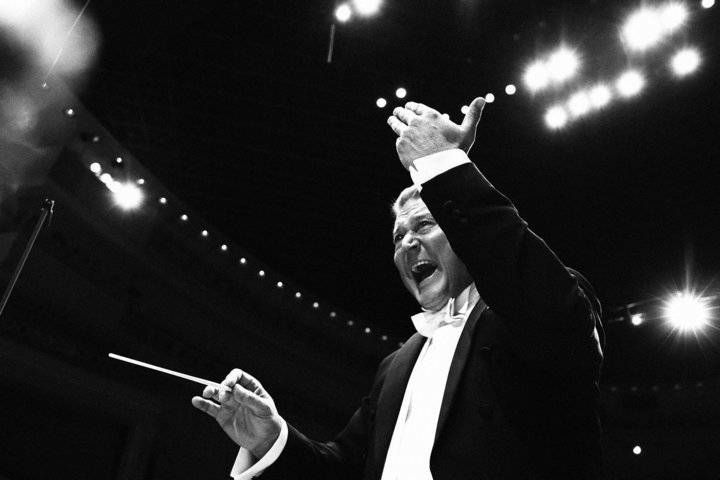
So, God grant that time helps us, that we move forward, that we have the opportunity to create!